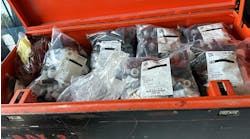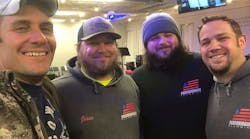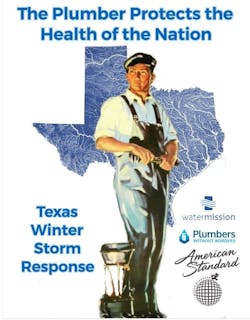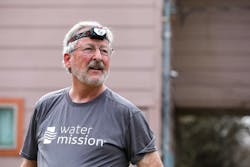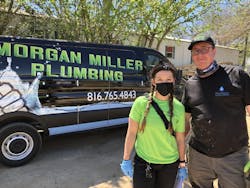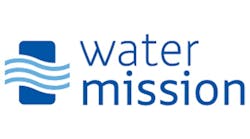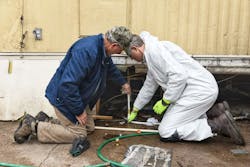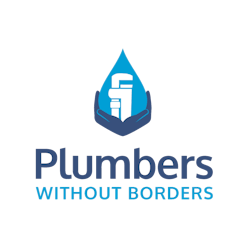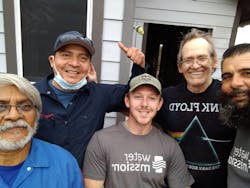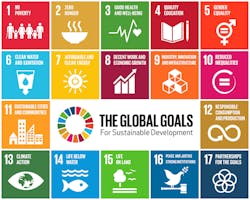Latest from Plumbing
Sponsored
2021 did not start off as a good year. Nearly a year after the highly infectious SARS-CoV-2 coronavirus hit our shores and manifested itself as COVID-19, ravaging the health and prosperity of many Americans, Winter Storm Uri descended on most of the country in mid-February. It brought snow, plunging temperatures and devastation to most of the country.
For Texans, snow, ice and bitter cold overwhelmed the state’s electricity infrastructure, pitching much of the state into darkness.
The culprit turned out to be inadequately winterized natural gas equipment—not frozen wind turbines and solar panels. And because Texas isolated its power grid (the Texas Interconnection) and deregulated its energy sector in 2002, state officials were unable to import electricity from other states.
Eventually, Texans began to experience what many Northerners experience in cold winter weather: frozen pipes.
And this is when Plumbers Without Borders (PWB) stepped up to help. The group responded to a call from Water Mission CEO and President George C. Greene IV, PE, to help the people of Texas with the ongoing plumbing crisis and lack of running water to millions of homes.
“Nearly half of the residents in one of the largest states in the U.S. [experienced] a plumbing catastrophe due to burst pipes from freezing temperatures and significant power outages,” Greene notes. “Not having water in your home means you can’t flush toilets, shower or wash clothes. With such a broad need, there is a huge demand for skilled labor and not enough hands to do the work.”
PWB Executive Director Carmela DiGregorio says that the group wanted to help its fellow Americans but had not yet identified a partner who could manage such a huge effort on the ground until it heard from Water Mission. “We don’t usually initiate or manage projects independently,” she explains. “Much like in a real-world construction situation, the plumber is scheduled in phases, dovetailing their trade with the coordinated scheduling of other trades.
“While well-timed coordination and scheduling of the various trades are expected in most everyday situations, it’s not typical in a disaster relief setting, especially when people are suffering from the lack of water and sanitation. Plumbers everywhere certainly relate to what being without water means for most people, but when it happens on the scale of a Texas-wide crisis, it strikes a deep chord for most plumbers who instinctively feel the urge to help.”
Getting the word out
“This major effort was so unusual because it was mainly about the need for plumbing repairs and the need for more plumbers due to the shortage of plumbers in the state of Texas,” she says. “We launched an immediate effort, which began generating positive responses from willing volunteer plumbers within hours. Assembling a team consisting of Water Mission’s engineering and disaster response professionals and Plumbers Without Borders’ volunteer plumbers proved to be an effective and successful strategy.”
At the same time, other industry heavyweights reached out to their networks. American Standard, which has supported PWB efforts for many years, added an appeal for plumbers on its website’s home page. “PWB’s volunteer database grew instantly, with many volunteers saying they had always hoped to be able to be a part of such a meaningful way to help by using their skills and time,” DiGregorio notes.
Viega donated 10 new Pressgun Picco 6 tools and ProPress and PureFlow jaws to be distributed to plumbers who don’t have their own press tools, making the plumbers’ jobs much easier.
In the days immediately after the freeze, the hydronic equipment and tools manufacturer improvised to overcome the challenge of delivering parts to Texas, where power outages meant truckers might not be able to refuel. It placed all other orders on hold to fill Texas orders first, instituted mandatory, six-days-a-week overtime and hired temporary workers to expedite orders.
And instead of sending partially full trucks to individual locations, as usual, the company sent completely loaded trucks to a central site in Texas, where customers could pick up products.
“As most of the plumbing contractors in the area were extremely backlogged with hundreds of work orders, and materials were in short supply, volunteer plumbers were asked to drive to Austin with their plumbing trucks/vehicles, helpers, tools and whatever additional materials they could find,” DiGregorio explains. “Plumbers from every section of the country were ready to jump into action, with many saying that this singular event of restoring water to our fellow Americans was one they found too timely and hard to resist.”
She adds that about 40 volunteers—including plumbers, apprentices, helpers and family members—came in weekly waves, from California, Colorado, Delaware, Florida, Georgia, Idaho, Illinois, Indiana, Kentucky, Maine, Maryland, Missouri, Nevada, New York, Ohio, Pennsylvania, Tennessee, Texas, West Virginia and Virginia. Many drove non-stop for several days.
Doing the work
One of the first lines of communications that PWB opened was with the City of Austin Plumbing Department and the Texas State Board of Plumbing Examiners.
“After considerable dialogue and mutual recommendations among city and state officials concerning the licensing requirements, the path forward for a provisional license was simplified,” Domenico DiGregorio says. “PWB learned through this process that ideally, when a state of emergency is declared, it would be optimum if all trades that required licensing had legal automatic reciprocity with other states’ licensing already in place.”
Many of the plumbing problems tackled by PWB volunteers involved burst water lines—from the incoming water to the fixtures in the house—often requiring plumbers to work in very tight and uncomfortable crawl spaces. Their focus was primarily on helping the most vulnerable residents: the elderly and under-resourced, disabled and uninsured people who were without water.
“Everyone, no matter their skill set, found many ways to help, including family member-business owners experienced with dispatching and assessing work orders, who proved extremely helpful in keeping the work rolling,” he says. “One master plumber from California flew his wife in to help out upon realizing not only how helpful she could be to the effort, but also how much they could both enjoy the new friendships that were quickly building among the volunteers.”
Carmela DiGregorio adds: “While the media contains various stories about a few plumbers (unrelated to PWB) who drove long distances to help out in Texas, the thing that differentiates PWB volunteer plumbers is that they did not charge a single penny for their services. They willingly endured long and exhausting 12-hour days, working in uncomfortably tight crawl spaces repairing burst pipes and broken plumbing systems. All for the most vulnerable residents who could not pay them—the true meaning of helping others!”
• Retired master plumber Paul Mitchell, who spent a couple of months in the hospital recovering from COVID-19, trekked to Texas with his wife, Diane, a business administrator; their son Joel, a civil engineer; and their mechanically gifted grandson David. They pulled a trailer on a 1,200-mile journey, loaded with thousands of dollars of donated plumbing supplies—from their church, friends and neighbors. In their first week, they were able to restore water for 120 families in a multi-unit building.
“Everyone that we met was so appreciative of the help,” Diane Mitchell says. “I just want everybody to have their water back.”
• Grandview, MO-based Morgan Miller Plumbing rescheduled work and gathered monetary donations as well as donated plumbing materials before loading up a plumbing service truck. Tosha Everhart and Jeff Morgan drove to Dilley, Texas, “with enthusiasm that they would soon be able to restore water to vulnerable residents who were without water for nearly a month,” according to the company’s Facebook page.
• Taylor Edwards, an apprentice plumber from Tennessee, spent two weeks working with the team from OmegaThe aftermath
Today, hundreds of families without running water after Winter Storm Uri hit now have safe water to drink—something most of us take for granted.
“While volunteer plumbers—and all plumbers in general—are still hard at work helping countless families to get their broken pipes repaired, the scope of the remaining work is mainly about the remediation of water damage,” Domenico DiGregorio explains. “Community organizations throughout the state have mobilized to help residents with debris clean-up caused by burst pipes and broken fixtures that destroyed so much of the homes’ interiors. Restoring homes to a safe, livable condition will undoubtedly take months of work yet.”
Water Mission is winding down and finishing up with the remaining volunteers there; it’s contracted with some local plumbing companies to take care of anything residual.
Plumbers interested in volunteering with PWB for future projects can sign up at www.plumberswithoutborders.org/volunteer.
Unfortunately, the scenario in Texas is one we may see again played out in other parts of the country. Domenico DiGregorio notes PWB learned several things while handling this crisis that it can use for the future.
“PWB would like to replicate the successful aspects of our partnership with Water Mission and the Austin Disaster Relief Network by working to establish relationships with boots-on-the-ground organizations and volunteer plumbers in all major cities to be able to quickly and effectively deploy in future crises.”
Carmela DiGregorio adds: “While Plumbers Without Borders and Water Mission have the shared vision and common goals represented by the Global Development Goals, particularly No. 6, safe water and sanitation, the strength and success of their efforts in this most recent Texas storm recovery was largely due to achieving and implementing Goal No. 17, partnerships for the goals!
“It’s no wonder that this goal was added as the culminating overall goal, as all these global development goals are only possible when groups, individuals, nonprofits, cities, states and countries all pull together in the same direction.”
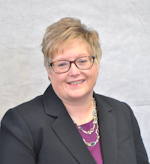
Kelly L. Faloon | Freelance Writer/Editor
Kelly L. Faloon is a contributing editor and writer to Contractor, Contracting Business magazine and HPAC Engineering and principal of Faloon Editorial Services. The former editor of Plumbing & Mechanical magazine, Faloon has more than 26 years of experience in the plumbing and heating industry and more than 35 years in B2B publishing. She started a freelance writing and editing business in 2017, where she has a varied clientele.
Faloon spent 3 1/2 years at Supply House Times before joining the Plumbing & Mechanical staff in 2001. Previously, she spent nearly 10 years at CCH/Wolters Kluwer, a publishing firm specializing in business and tax law, where she wore many hats — proofreader, writer/editor for a daily tax publication, and Internal Revenue Code editor.
A native of Michigan’s northern Lower Peninsula, Faloon is a journalism graduate of Michigan State University. You can reach her at [email protected].
